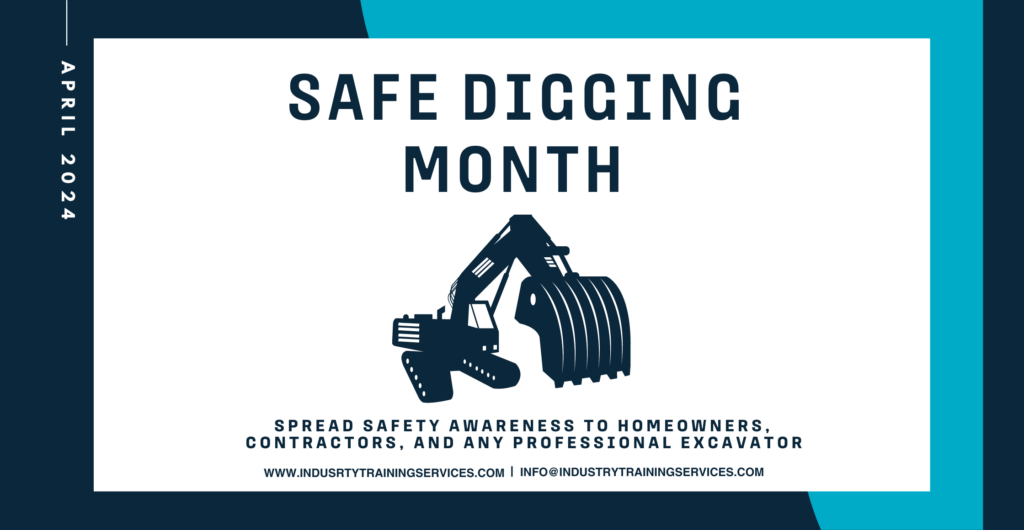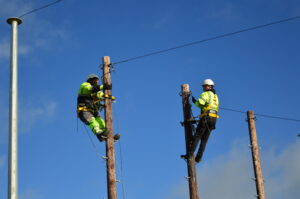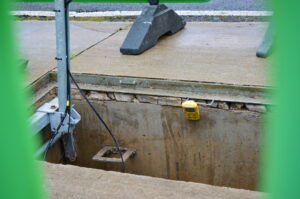As part of safe digging month, we wanted to raise awareness and educate people on safe digging practices. Do you know the danger’s, protocols, and what to do in a case of an emergency when it comes to working in excavations? Do you and your work colleagues work safely within excavations? Maybe that’s a question you should ask yourself and think about how you could improve yours and others health and safety while at work.
Permits to Safe digging
First things first, do you have a permit to dig? The NI direct website it states that if you intend to conduct any work in close proximity to, on, alongside, above, or beneath a road, you must apply for consent or a license. This includes activities such as excavations, construction, modifications, or the installation of structures like scaffolding.
Before you begin to dig you will need to apply online for consent to do this through the official GOV website. Without having consent you could find yourself being fined up to £1000 if you carry out works without permission from DRD.
Safeguarding workers in excavation projects
Excavation work carries various risks, requiring strict safety precautions. Projects involving soil near underground utilities and structures need skilled operators to prevent accidents. Some dangers that workers should be aware of are issues such as trench collapses and buried utilities. Depending on conditions, a cubic metre of social can weigh in excess of 1.5 tonnes. Effective communication, training, and safety procedures are essential for risk reduction in such scenarios.
Compliance with regulations like the Health and Safety at Work Act 1974 (UK) and the Safety, Health and Welfare at Work Act 2005 (Ireland) is vital. Likewise, conducting thorough risk assessments and using protective equipment are also crucial. Regular inspections and readiness for emergencies further enhance safety, ensuring the well-being of everyone involved in excavation projects.
Hazards of Excavations Include:
1. Collapsing Trenches: Excavating without proper shoring or trench boxes can lead to trench collapses, trapping workers under tonnes of soil and debris.
2. Striking Underground Utilities: Failure to locate and identify buried utilities like electrical cables, gas lines, or water pipes before digging can result in severe injury, utility service disruptions, or even explosions.
3. Equipment Accidents: Mishandling heavy machinery such as excavators can cause equipment rollovers, collisions, or crush injuries to workers on-site.
4. Falls and Trips: Uneven terrain, debris, or insufficient lighting around excavation sites increase the risk of workers tripping or falling into trenches, leading to injuries or falls from heights.
5. Hazardous Atmospheres: Excavations can become confined spaces and can expose workers to hazardous gases like carbon monoxide or methane, posing risks of asphyxiation, poisoning, or explosions.
The Hidden Potential of Digger Training
Training for excavation enhances safety and efficiency by unleashing potential. When workers become proficient in operating equipment and excavation methods, it empowers them, leading to increased productivity and innovation in the construction industry.
Some of these potentials include:
- Improved Safety: Digger training equips operators with the skills and knowledge needed to operate heavy machinery safely, reducing the risk of accidents, injuries, and fatalities on construction sites.
- Increased Efficiency: Properly trained digger operators are more efficient and effective in their work, leading to smoother project workflows, faster completion times, and reduced downtime due to equipment misuse or errors.
- Cost Savings: Investing in digger training can lead to long-term cost savings by minimising equipment damage, avoiding costly repairs, replacements, and reducing insurance premiums associated with accidents and injuries.
- Compliance with Regulations: Digger training ensures that operators understand and comply with relevant health and safety regulations, reducing the risk of legal liabilities and penalties for non-compliance.
Safety Training Courses
ITS take pride in providing digger training programmes accredited by renowned awarding bodies like NPORS, CPCS, CSR plant card scheme, and our own ITS certified training. Through our training courses, participants gain industry-standard guidance and hands-on experience in safe and efficient excavations.
Our diverse accreditations cater to both newcomers and seasoned professionals within the industry with the objective to equip individuals for success in construction and machinery/excavation operations.
Conclusion
Safe Digging Month shines a spotlight on the importance of understanding the risks involved in excavation work. From gaining permits to protecting workers, safety always takes the lead role.
We have more information on our safety in excavation courses here on our website.
To enquire about a course contact us on:
Dublin HQ: 01 891 6105
Portadown HQ: 028 3839 8700
[email protected]





